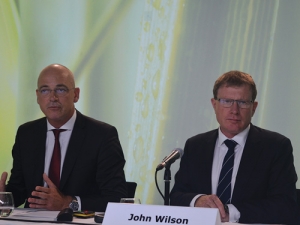Fonterra Suppliers Confident in Mainland Dairy Future
Fonterra's 460 milk suppliers in Australia, who will switch to Lactalis end of this month, are unfazed with the impending change.
 Fonterra chief executive Theo Spierings makes a point to journalists while chairman John Wilson looks on.
Fonterra chief executive Theo Spierings makes a point to journalists while chairman John Wilson looks on.
Fonterra chairman John Wilson says he is absolutely confident dairying will recover back to sustainable pricing levels for farmers.
However, he says the recovery is taking longer than everyone anticipated.
The key factor remains the extra milk coming out of Europe. But Wilson told Dairy News that there are signs Europe's milk growth is slowing. Fonterra has been talking to European dairy co-ops and agri analysts, Wilson says.
Over the last two years milk production has ramped up in the EU, backed by higher prices and new investment on farms.
According to Fonterra's latest global update, production in the EU in December increased 5% over the same month the previous year.
The EU has seen growth in milk production in each of the nine months following the removal of quotas on April 1, 2015. Production for the 12 months to December increased 2% compared to the same period the previous year, or an increase of 3.2 billion litres. Over this period Ireland was up 13%, Netherlands 7%, Poland 3% and the UK 2%.
The EU is also pumping most of the extra milk into export markets. EU exports increased 10% in November compared to the same month the previous year. Increases were seen in most of the major dairy categories with only SMP decreasing over the month. Exports have increased 7% for the 12 months to November, largely as a result of fluid and fresh dairy up 15%, whey powder and SMP up 9%, and infant formula up 7%.
But now it is becoming uneconomical for farmers in some regions. Some EU countries are introducing caps on stocking rates to minimise damage to the environment.
Wilson says Fonterra now supports analysts' view that Europe's milk production growth will slow to 1.5% compared to global demand rising by 2-3%. Demand for more milk will come from China, Asia and Africa.
"Once we reach a position where demand is greater than supply, prices will improve," Wilson says.
However, he is unable to suggest a timeframe. "We are still confident prices will rise but picking the exact time period is hard."
Wilson says other factors, such as US milk production and geo-political events, are also impacting milk prices.
According to Fonterra's global update, US production in January was in line with the same month last year. While the rate of milk production growth has continued to slow, for the 12 months to January it remains up 1% on the same period last year.
But most US milk is used in the burgeoning local market.
DairyNZ Chair Tracy Brown has seen a lot of change since she first started out in the dairy sector, with around one-third of dairy farmers now women.
Castle Ridge Station has been named the Regional Supreme Winner at the Canterbury Ballance Farm Environment Awards.
The South Island Dairy Event has announced Jessica Findlay as the recipient of the BrightSIDE Scholarship Programme, recognising her commitment to furthering her education and future career in the New Zealand dairy industry.
New Zealand and Chile have signed a new arrangement designed to boost agricultural cooperation and drive sector success.
New DairyNZ research will help farmers mitigate the impacts of heat stress on herds in high-risk regions of the country.
Budou are being picked now in Bridge Pā, the most intense and exciting time of the year for the Greencollar team – and the harvest of the finest eating grapes is weeks earlier than expected.